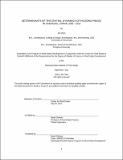| dc.contributor.advisor | David Geltner. | en_US |
| dc.contributor.author | Chen, Jin | en_US |
| dc.contributor.other | Massachusetts Institute of Technology. Center for Real Estate. Program in Real Estate Development. | en_US |
| dc.coverage.spatial | a-cc--- | en_US |
| dc.date.accessioned | 2013-02-15T14:40:40Z | |
| dc.date.available | 2013-02-15T14:40:40Z | |
| dc.date.copyright | 2012 | en_US |
| dc.date.issued | 2012 | en_US |
| dc.identifier.uri | http://hdl.handle.net/1721.1/77119 | |
| dc.description | Thesis (S.M. in Real Estate Development)--Massachusetts Institute of Technology, Program in Real Estate Development in Conjunction with the Center for Real Estate, 2012. | en_US |
| dc.description | Cataloged from department-submitted PDF version of thesis. This electronic version was submitted and approved by the author's academic department as part of an electronic thesis pilot project. The certified thesis is available in the Institute Archives and Special Collections. | en_US |
| dc.description | Includes bibliographical references (p. 83). | en_US |
| dc.description.abstract | Housing unit prices differ among 75 street blocks per time period in Chengdu, China. Housing unit price's appreciation also moves differently in the 75 street blocks between 2005 and 2010. With solid transaction data acquired from Chengdu Housing Administration Department, two regression models, Level Model and Change Model are exercised to explore two questions: What are determinants of cross-section housing unit price difference and what are determinants of housing unit price movement in time? The findings are consistent with urban economic theory and actual practice in the market. In conjunction with physical attributes and locational features, the thesis found from the Level Model that economic and demographic characteristics, which are representations of urban economic growth, industrial restructuring and demographic transformation, are also significant determinants that have been capitalized into housing unit price at various levels. In a rapid developing city like Chengdu, the thesis found from the Change Model that instead of the change of various factors, inherent locational features and the initial price per street block play significant roles moving unit price upward in both short-term (1-year) and relatively long-term (5-year). Such finding exhibits consistent market anticipation that housing and amenity demand constantly outpace its supply in Chengdu. Additional Level Models defined by unit size reveal differentiated capitalization effects from same group of locational features. The result ties various sizes of units with corresponding housing products. Subsequently it proves that demographic structure is a significant determinant of housing price dynamics. Field trip and interview are conducted to bridge academic analysis with real market. The findings from qualitative research contribute valuable inputs to improve the models. Understanding determinants that are capitalized into price and move price appreciation is useful to household to guide wise investment. The research is also referable to developer who can make sound assessment on developable land with better understanding of its potential value. The more inclusive analysis of spatial housing price dynamics will assist policy maker to establish proper urban policy in the effort to balance urban structure between housing and jobs. | en_US |
| dc.description.statementofresponsibility | by Jin Chen. | en_US |
| dc.format.extent | 83 p. | en_US |
| dc.language.iso | eng | en_US |
| dc.publisher | Massachusetts Institute of Technology | en_US |
| dc.rights | M.I.T. theses are protected by
copyright. They may be viewed from this source for any purpose, but
reproduction or distribution in any format is prohibited without written
permission. See provided URL for inquiries about permission. | en_US |
| dc.rights.uri | http://dspace.mit.edu/handle/1721.1/7582 | en_US |
| dc.subject | Center for Real Estate. Program in Real Estate Development. | en_US |
| dc.title | Determinants of the spatial dynamics of housing prices in Chengdu, China, 2005-2010 | en_US |
| dc.type | Thesis | en_US |
| dc.description.degree | S.M.in Real Estate Development | en_US |
| dc.contributor.department | Massachusetts Institute of Technology. Center for Real Estate. Program in Real Estate Development. | en_US |
| dc.contributor.department | Massachusetts Institute of Technology. Center for Real Estate | |
| dc.identifier.oclc | 825107212 | en_US |
